BIG STORY
Ex-Generals Demand Crackdown As Terrorists Kill Over 700 Soldiers In 18 Months
Published
3 years agoon
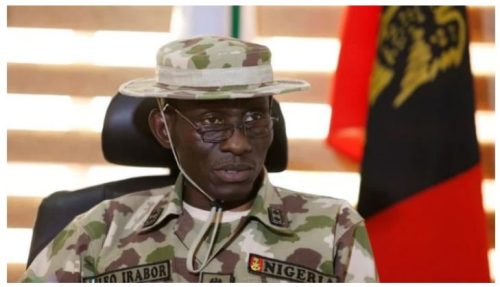
Worried by the incessant killing of soldiers by terrorists and other criminals in some parts of the country, especially the North, some retired army generals have called on the concerned authorities to urgently halt the dangerous trend.
It was gathered that no fewer than 714 soldiers had been killed by terrorists in the last 18 months, while several others had suffered varying degrees of injury. This, coupled with the worsening insecurity in the country, was described by the ex-generals as disturbing.
They stressed that the killing of soldiers, who were grossly inadequate to confront the widespread insecurity in the country and should be protecting civilians and the territorial integrity of Nigeria, could not be allowed to continue.
A report by a geopolitical intelligence platform, SBM Intelligence, revealed that no fewer than 642 soldiers were killed between the fourth quarter of 2020 and the third quarter of 2021. While about 72 soldiers have so far been killed by terrorists this year.
A retired Brigadier General, John Sura, described as unacceptable the way soldiers were being killed by terrorists, saying there was a need for the troops to be equipped with modern technologies to protect themselves and win the war. He also stressed the need for synergy between the security agencies.
Sura stated, “It’s pathetic and terrible; the troops are doing their best because they have no equipment to notice terrorists from afar before they come under attack. It is painful and it is discouraging. I think the Federal Government must help them with modern technologies that can be able to detect and take these people up.
“They (the terrorists) are already taking the battle to the armed forces, which is not too good. Nobody is happy that people, who have risen to protect Nigerians, are losing their lives. As retired military officers, we are not happy with what is happening in the country in terms of security, because the institution of the military, which we served selflessly and what has given us a name as a country, is being seen as failing in its responsibility. As it is, the country is almost being consumed by insecurity.
“What has happened to the A-29 Super Tucano fighter jets purchased by the Federal Government? Why have they not deployed the fighter jets to neutralise the insurgents so that Nigerians can have peace?
“Yes, the military cannot be everywhere and that is why we have the National Intelligence Agency, the Department of State Services and others, who should network, synergise and provide intelligence that will help to track these people wherever they may be.”
He said the Federal Government should reconsider hiring mercenaries as the previous government did.
“The previous administration hired foreign mercenaries and they were almost winning the war against terrorists, but that approach was dropped when the present administration came on board. I think that rather than waste resources that may not get the desired results, why not bring these mercenaries back, pay them and let them trash the terrorists in Nigeria. They may be able to deliver on the task because they will be paid for it,” Sura added.
Another retired officer, Brig.-Gen. Jon Temlong, said it was disturbing that soldiers and civilians were being killed, but that soldiers losing their lives could be tied to the asymmetric nature of the war.
Temlong, who is a former Commander, 23 Armoured Brigade, Yola in Adamawa State, expressed dissatisfaction over the attitude of some Nigerians towards assisting the military to overcome the security situation in the country.
He said, “What some people don’t know is that the military is fighting asymmetric warfare. In this kind of warfare, you don’t know the enemy. The enemy can even greet you and pass, and because you don’t know him as the enemy, you can’t deal with him as such. The same people who greeted you and went their way can assemble themselves and come back to attack you.
“It pains me what the military is going through and nobody cares, forgetting that they are also Nigerians with families, who are daily putting their lives on the line for the sake of the country. So, it is the citizens who have taken arms against the people. They know them.”
The retired general, who was once the Commander, of Multinational Joint Task Force, Baga, said unless the citizens started isolating the terrorists, the solution to the problem might not be in sight, adding, “So, there is the need for synergy, especially between the federal, state and the local governments. The strategy in dealing with the security situation we are facing is government and civil approach.”
Similarly, a former Military Administrator of the defunct Western State, Major General David Jemibewon (retd.), described the development as worrisome and advised the government to launch a high-powered investigation.
He told one of our correspondents in an interview, “My reaction here is most similar to the reaction of anybody who likes peace and order in society. Those in authority should know that we have to tighten our belt and ensure that the country is more secure than before.”
He said contrary to the belief of the perpetrators, the attacks would not portray them as courageous but stupid, adding, “I wouldn’t say that it is an act of courage, I will say it is stupidity,” noting that the attackers must have been under the influence of drugs.
Speaking on how to prevent further attacks, Jemibewon stated, “The government should carry out a high-powered investigation and the military needs to raise the level of alertness. We must be alert and prepared to salvage our country from irresponsible people and we must take up that responsibility.”
The Commandant, Amotekun Corps, Osun State, Brig.-Gen. Bashir Adewinbi (retd.) also described the killing of soldiers as worrisome, saying there was a need to increase intelligence gathering to address the situation. He expressed confidence that Nigerian soldiers were properly trained and would perform creditably if they had better equipment.
He said, “It is a very worrisome situation and the Chief of Defence Staff and the President are taking drastic measures. I believe there will be an improvement. They are strategising and are doing everything possible to secure the country.
“However, they need to gather more intelligence to enable them to ameliorate the situation. I know they are brainstorming on this and I believe something positive will come out of this.
“I am worried, but it is one of those things in a democratic set-up. If you look at it, there could be political, economic and other social reasons for the insecurity. The problem is not peculiar to the Nigerian Armed Forces, but they are rising up to the task.”
Meanwhile, the SB Morgen Intelligence report indicated that 642 military personnel were killed. It noted that within the period under review, 322 police, 11 personnel of the Nigeria Security and Civil Defence Corps, five Customs officers, two operatives of the Department of State Services, two Immigration officials and an official of the Federal Road Safety Corps were killed by criminals.
As of 2021, reports said there were about 30,000 bandits – now designated terrorists – across the North. But according to the SBM report, 1,989 bandits and 973 Boko Haram fighters were killed within the period.
Among the series of attacks against troops, on April 6, 2022, it was reported that terrorists killed 17 soldiers during an attack on a military base in Pole Wire, Birnin Gwari Local Government Area of Kaduna State.
“About 40 fatally wounded soldiers were brought in to the 44 Army Reference Hospital and 17 of them were confirmed dead,” a source told The PUNCH.
On the night of Thursday, March 31, terrorists also killed six soldiers in the Suleija-Zuma area of Niger State.
On March 9, bandits killed 19 security personnel, including 13 soldiers, in Kanya, a village in the Danko-Wasagu area of Kebbi State.
In February 2021, 20 soldiers were killed by the Islamic State West Africa Province-backed faction of Boko Haram in Marte town.
Among several others, in April 2021, 11 soldiers were killed in the Bonta community, Konshisha Local Government Area of Benue State, by bandits. They were buried in the state capital by the military.
AGF office keeps mum over the naming of terrorism financiers
Meanwhile, despite the rising insecurity in the country, the Office of the Attorney-General of the Federation, Abubakar Malami, SAN, has yet to name the financiers of terrorism in Nigeria.
The Attorney-General of the Federation and Minister of Justice, Abubakar Malami, has been under pressure to name and shame the financiers of terrorism in the country.
When asked recently during an interview on Channels Television, Malami promised that in a few weeks Nigerians would “get something tangible” from him in that regard, but he has yet to do so.
Similarly, the Minister of Information and Culture, Lai Mohammed, disclosed at a press conference in Abuja on February 4 that the Nigerian Financial Intelligence Unit had uncovered 96 financiers of terrorism as well as 424 associates and supporters of the alleged financiers. Their identities were also not disclosed.
While the Nigerian authorities refused to name the financiers despite the worsening insecurity, the United States Government, on March 25, named six Nigerians for their support for the Boko Haram terrorist group.
The US Department of the Treasury’s Office of Foreign Assets Control gave names as Abdurrahman Ado Musa, Salihu Yusuf Adamu, Bashir Ali Yusuf, Muhammed Ibrahim Isa, Ibrahim Ali Alhassan and Surajo Abubakar Muhammad.
The Special Assistant to the AGF, Dr Umar Gwandu, had earlier told one of our correspondents that the financiers of terrorism would be unveiled in court, but he refused to state when that would be done.
Despite multiple calls and messages sent to his WhatsApp number, which were read, Gwandu declined to comment on the issue.
Delay in prosecuting terrorists, a bad signal – SANs
Speaking about the issue, a Senior Advocate of Nigeria, Ebun-Olu Adegboruwa, said shielding the financiers of terrorism would not help in the fight against insecurity.
He said, “The challenge we have is the manner in which the government is treating the issue of terrorism with seeming preferential treatment. We know that in the case of the Indigenous People of Biafra, the AGF quickly got the Federal High Court to declare the members as terrorists.
“As we speak today, the United Arab Emirates has listed some people, who are said to be sponsors of Boko Haram, and they are Nigerians, and this has not been denied by the Federal Government.
“If we do not take steps to combat terrorism, with all the Tucano jets that are not being used, it will create an impression that this regime is producing terrorists, either to foment violence during elections or for the purpose of keeping itself in power after 2023.
“Otherwise, there is no justification why they are yet to be tried in court and why their identities have not been revealed. I believe it is dangerous for us and it has emboldened the terrorists. Not naming them will not help the matter at all.”
Another Senior Advocate of Nigeria, Lekan Ojo, said unmasking the financiers of terrorism would convince Nigerians that the government was serious about combating insecurity.
He stated, “The government should unmask and bring these financiers to justice as soon as possible. That will assuage the feelings of Nigerians, who have rightly or wrongly contended that the government is not dealing decisively with the terrorists and their financiers.
“The financiers are as guilty as those they are financing. I am sure no responsible government will arrest these people and refuse to arraign them before a court of law.”
However, Adewinbi said the Federal Government could have its reasons for the delay, noting that the investigation could still be ongoing.
“If they think that prosecuting them now will scale up to other activities, they will want to conclude their activities before they do anything,” he added.
Sura was, however, of the view that the financiers must be punished to put an end to the crime while calling on the Federal Government to hasten their prosecution.
He added, “In any society, when someone has not been seen to have been punished for a crime, it will encourage other people to go ahead and commit that crime, but when you punish an offender, it serves as a deterrent to others.
“For me, I will suggest that the Federal Government or whoever is responsible should expedite action and ensure it is seen by everyone. It will discourage people from committing the offence.”
You may like
-


JUST IN: US Clarifies New Visa Rule For Nigerians, Cites Global Security Standards
-


Autonomy Standoff: Governors Get N4.5tn Local Government Funds One Year After Supreme Court Ruling
-
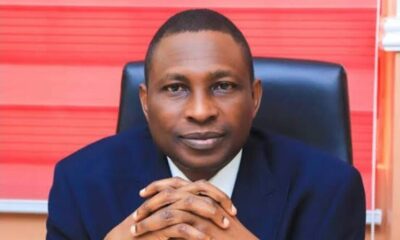

Corrupt Politicians Using Crypto Wallets To Launder Money — EFCC Chairman Olukoyede
-


Troops Kill 24 Terrorists In Borno, Repel Kebbi Bandits
-
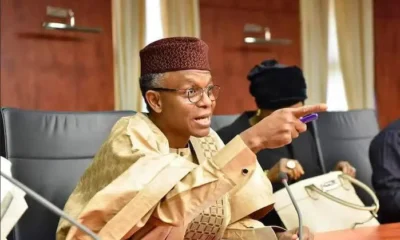

“Your Turn Will Come To Leave Power” — El-Rufai Tells Political Office Holders
-
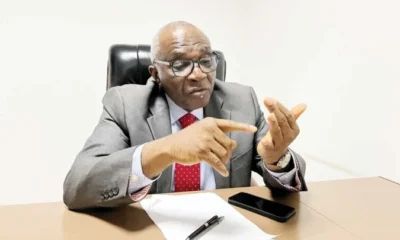

Buhari Couldn’t Have Won 2015 Election Without Tinubu’s Strategic Support — Bayo Onanuga
1 Comment
Leave a Reply
Cancel reply
This site uses Akismet to reduce spam. Learn how your comment data is processed.
BIG STORY
JUST IN: US Clarifies New Visa Rule For Nigerians, Cites Global Security Standards
Published
18 hours agoon
July 11, 2025
The United States government says its decision to limit most non-immigrant and non-diplomatic visas issued to Nigerians to single-entry and a three-month validity is based on “global security standards”, not a retaliatory move.
A statement released by the US Department of State on Tuesday said the updated policy, which took effect on July 8, 2025, applies to new visa issuances and will not affect visas granted before that date.
“U.S. visa criteria and standards are designed to protect the integrity of U.S. immigration systems. These standards are based on global technical and security benchmarks. The U.S. Mission is working with the Government of Nigeria to ensure that Nigeria can meet the criteria,” the statement reads.
The statement explained that visa reciprocity is subject to continuous review and can be adjusted at any time, including changes to the number of permitted entries and visa validity periods.
The new visa policy affects only non-immigrant and non-diplomatic categories, meaning most short-term travelers for business, tourism, and study will now receive visas valid for just three months and for one entry into the US.
The announcement generated mixed reactions with reports linking the move to Nigeria’s stance on third-world deportees.
But a statement by the US mission in Nigeria on Friday said the changes are part of a global effort to align visa policies with security priorities, not a country-specific decision.
“This reduction is not the result of any nation’s stance on third-country deportees, introduction of e-visa policies, or affiliations with groups like BRICS,” the statement reads.
“The reduction in validity is part of an ongoing global review of the use of U.S. visas by other countries using technical and security benchmarks to safeguard U.S. immigration systems.
“We value our longstanding partnership with Nigeria and remain committed to working closely with the Nigerian public and government officials to help them meet those criteria and benchmarks, thereby ensuring safe, lawful, and mutually beneficial travel between our nations.”
Since taking office, US President Donald Trump has signed a flurry of executive orders aimed at deporting millions of “illegal immigrants” — many of whom are asylum seekers — back to their countries of origin.
Diplomatic sources had said Trump has been putting pressure on many countries to serve as temporary homes for asylum seekers until their cases are treated, and this usually takes up to seven years.
A few countries have already received some deportees. However, Nigeria has refused to be part of the arrangement. Discussions took place but were unsuccessful owing to Nigeria’s unwillingness to accept non-citizens, many of whom had a number of years left to finalise their asylum applications.
The sources said Nigeria’s refusal to accept asylum seekers from the United States is partly responsible for the recent visa restrictions.
BIG STORY
Autonomy Standoff: Governors Get N4.5tn Local Government Funds One Year After Supreme Court Ruling
Published
22 hours agoon
July 11, 2025
Exactly one year after the Supreme Court granted full autonomy to Nigeria’s 774 local government areas, the Federal Government continues to route allocations through state governments.
An analysis by The Punch reveals that state governors have retained control over council funds amounting to N4.5tn, in defiance of the historic ruling that mandated direct disbursement of funds to local governments.
On July 11, 2024, the Supreme Court declared that local governments should receive their allocations directly from the Federation Account, ruling that the previous practice of passing funds through state governments was unconstitutional.
Following the verdict, the Federal Government set up an inter-agency committee to enforce the decision and instructed the Central Bank of Nigeria to create dedicated accounts for each of the 774 local government councils to enable direct payments.
But one year later, findings by The Punch indicate that the directive remains largely unimplemented.
Allocations to local governments are still being funneled through state governments, with the process hampered by delays and disagreements involving the Central Bank, state governments, local council authorities, and other stakeholders.
Data from the Federation Account Allocation Committee shows that between July 2024 and June 2025, a total of N4.496tn was allocated to local government councils.
This represents 24.87 per cent of the N18.074tn shared among the three tiers of government over the 12-month period.
According to the monthly communiqués released by FAAC, N337.02bn was allocated to LGs in July 2024, N343.70bn in August, N306.53bn in September, N329.86bn in October, and N355.62bn in November.
In December, local governments received N402.55bn, followed by N361.75bn in January 2025, N434.57bn in February, and N410.56bn in March.
Subsequent allocations included N387bn in April, N406.63bn in May, and N419.97bn in June.
Although the percentage of the total allocation going to local governments has remained steady, ranging between 24 and 25 per cent each month, the method of disbursement continues to breach the Supreme Court’s judgment.
An official at the Office of The Attorney General of the Federation, told The PUNCH that the AGF had done his bit, stating that the FG set up a committee to work on ensuring that the LGs were granted full autonomy.
Our source said, “The Attorney General is not the one in charge of disbursing of funds. The implementation committee raised by the Federal Government is chaired by the Secretary to the Government of the Federation. AGF is just a member there and he is not even the secretary. The Minister of Finance is there.
“The AGF has already gone to court and won the case and the moratorium, which was given to the governors before, was for them to conduct their local government elections, which I think all of them have complied with.
“The committee that was raised, ALGON is part of it, Labour is part of it. Those are the people to direct some of these questions to.”
The General Secretary of the Association of Local Governments Employees, Muhammed Abubakar, while speaking with The PUNCH on Thursday evening said the association was patiently waiting on the Office of the Secretary to the Government of the Federation to give updates on the documents submitted to President Bola Tinubu.
According to Abubakar, Tinubu listened to the concerns of the governors and mandated the Secretary to the Government of the Federation, George Akume, and the Attorney General of the Federation, Lateef Fagbemi (SAN) to work on the bottlenecks affecting the implementation of the judgment.
“No one has gone quiet. The process is still ongoing. The governors had some concerns and the President gave a listening ear to the governors. The President then mandated the SGF and AGF to work on the bottlenecks and concerns raised by the governors. They have communicated it to the Presidency. We are just waiting for the SGF to share updates on whether the President has received all the details.”
Confirming the delay in implementing the court ruling, the Gombe State, NLC chairman, Yusuf Bello, said nothing has changed nationwide.
He noted that appointed chairmen still lacked control over funds, while autonomy remained elusive.
According to him, only local government elections conducted by the FG can bring meaningful change and improve grassroots governance.
He said, “Does any chairman have the right to touch the money? It’s still pocketed, it’s the same scenario all over the nation.”
A source at the NULGE Gombe office under anonymity said that the challenge of implementation is nationwide.
He said, “I can confirm that all paper works have been completed. Implementation is not only a Gombe issue, it’s nationwide. Gombe is not one of the states where the executive puts eyes on the resources each LGA is allowed to spend freely.”
It was also gathered that the 16 LGs in Kwara State were yet to open accounst with the CBN.
The Chairman, NULGE, Kwara chapter, Seun Oyinlade, disclosed this in a telephone conversation with Punch correspondent in Ilorin on Tuesday.
“The local government chairmen are yet to open accounts with the CBN.”
Chairman of the state branch of the Nigeria Labour Congress, Comrade Saheed Olayinka said he was not aware that the LGs had opened the CBN account, adding that the accounts might be opened this month.
It was further gathered that the 44 LGs in Kano State were yet to comply with the directive of the CBN on the opening of accounts at the apex bank.
A reliable source at the Ministry for Local Government and Chieftaincy Affairs, who spoke on condition of anonymity, told The PUNCH, “To my knowledge, none of the 44 councils in the state has opened accounts with the CBN.
“We heard that the apex bank has opened an account for each of the local governments and what remains is to regularise the accounts, which is yet to be done,” the source said.
Our source accused the local government council chairmen and the NULGE officials of not making moves or efforts to ensure that the councils opened the accounts as directed by the apex bank because of what he described as personal benefits.
The Kano State Commissioner for Information and Internal Affairs, Ibrahim Waiya, confirmed that local governments in the state were yet to begin receiving statutory allocations directly from the FG.
He described the issue as national, adding that most northern states had not completed the internal requirements needed for full compliance, including setting up LG service commissions.
Waiya said Kano has made progress by establishing its own commission, chaired by Malam Ibrahim Jibrin.
He added that Governor Abba Kabir Yusuf had granted LGs autonomy to manage resources independently.
The Chairman, NULGE, Bayelsa State, Comrade ThankGod Singer, says states and local government councils all over Nigeria operated the Joint Account Allocation Committee.
Singer said several local government councils were yet to open dedicated accounts with the CBN but added that there was no problem in Bayelsa as the state government and the local government councils sat at JAAC to manage the allocations.
“JAAC is still being operated all over the country and here in Bayelsa State, we have no problem. Salaries are being paid, projects are going on and the state government is assisting the local governments in the payment of teachers’ salaries,” he stated.
According to The Punch, Benue State Government was yet to comply with the Supreme Court ruling.
Despite public claims by the government that autonomy had been implemented, findings by our correspondent indicated otherwise, with several local government chairmen in the state dismissing such claims as false and misleading.
Three council chairmen, who spoke on condition of anonymity, said the administration’s declaration of local government autonomy was a mere facade.
One chairman from Benue North East expressed disappointment with the recent statement by the state ALGON chairman, Maurice Orwourgh, who claimed that local councils in the state operated autonomously.
He stated, “If autonomy truly exists, why does the state government still allocate us N10m monthly as security votes? The least LGs receive is N385m monthly from federal allocation—why do we need state subvention?”
Another chairman from Benue North West lamented that none of the 23 LGAs has executed any meaningful project since the current administration came on board.
“Not even a culvert has been constructed,” he said, describing the government’s position as lip service.
From Benue South, a chairman linked the denial of LG funds to rising insecurity.
“What can N10m do as security vote in a month? It can’t even cover fuel costs,” he said.
Former governor Samuel Ortom also criticised the incumbent Governor Hyacinth Alia for flouting the Supreme Court judgment.
In a statement issued through his media adviser, Terver Akase, Ortom questioned why the governor is still controlling council finances, despite the court’s directive.
“That none of the 23 LGAs has constructed even a single culvert shows how starved they are of their funds,” he said.
The NULGE in Nasarawa State said the 13 LGs in the state had long opened their accounts, and ready to receive direct allocation from the FG.
The chairman of NULGE in the state, Adamu Sharhabilu, however, noted that the local councils were yet to receive their allocations directly from the FG.
He said, “At the moment, there are currently no obvious plans by the Nasarawa State government to shortchange the local government workers or frustrate the LG Autonomy implementation in the state.
“I can inform you that Governor Abdullahi Sule has been expressing his commitment to work towards ensuring that local government workers get what is due to them and also enjoy all the benefits of the LG autonomy.
“However, the FG has not given the LGs a single Kobo in Nasarawa. The money has always been sent to the joint accounts. No local government has received funds directly from the Federation Account.”
The Bauchi State chapter Chairman of NULGE, Muhammad Yunusa, said despite the Supreme Court’s judgment, local governments in the state have also not been able to open bank accounts with CBN.
He explained that the union was working tirelessly to ensure the implementation of the judgment.
“The union has submitted a memorandum to the Senate and plans to do the same with the House of Representatives, all on the matter.”
Also, the Jigawa State NLC chairman, Sanusi Maigatari, said LGs in the state had been receiving their funds from federal allocation prior to the apex court order.
However, he couldn’t shed light on whether the LGs had opened bank accounts with the CBN for direct allocation reception.
Maigatari advised the state government to fill gaps necessary for enhancement of financial and administrative autonomy of LGs for state development.
On his part, the NULGE chairman in Jigawa, Abubakar Shitu, echoed similar sentiments, stating that the state had almost achieved 95 per cent LG autonomy.
“Unlike in some other places, here in Jigawa, we don’t have issues with LG financial autonomy but administrative autonomy,” he said.
He highlighted some deductions made by the state government, including two per cent contribution to Sule Lamido University and one per cent to the state Local Government Service Commission, which he clarified were duly recognised by the law of the state.
“These deductions include 2.5 per cent for the Ministry of Local Government. Despite these deductions, Jigawa State LGs seem to be functioning relatively autonomously,” he stated.
Shitu also emphasised that the problem with LG autonomy lied with the FG, citing the lack of a Certified True Copy of the Supreme Court judgment.
However, while other LGs lament the delay in implementation of the ruling, the Adamawa State Chairman, ALGON, and Chairman, Toungo LG, Suleiman Gankuba, confirmed to The PUNCH that councils received federal allocations directly from the FG.
“Governor Ahmadu Fintiri granted local governments autonomy before the Supreme Court judgment, so for us in Adamawa, councils’ autonomy is not a new issue to us,” he said.
The state’s Commissioner of Finance, Augustina Wandamiya, told The PUNCH, “Adamawa is the first state to implement local autonomy without waiting for the Supreme Court judgment because Governor Fintiri believes in the rule of law and separation of powers,” she said.
SANs fault non-implementation
Some of Nigeria’s most prominent constitutional lawyers have faulted the continued disregard for the Supreme Court’s ruling on local government autonomy, one year after the landmark judgement was delivered.
Senior Advocates of Nigeria, in separate interviews, described the non-compliance as a blatant affront to the rule of law, with some calling out both the Federal and state governments for frustrating enforcement.
Professor Mike Ozekhome (SAN) condemned what he described as a deliberate effort by state governors to circumvent and disobey the Supreme Court’s judgement.
He noted that the ruling was unambiguous in declaring that allocations from the Federation Account under Section 162 of the 1999 Constitution should no longer be routed through the State Joint Local Government Account, but paid directly to the councils.
“The judgment was clear, as clean as a whistle. It was meant to end the practice where governors deduct funds at source, starving the third tier of government of the resources needed to serve grassroots communities,” he said.
Ozekhome also pointed to the power imbalance between state governors and local government chairmen, many of whom, he argued, never truly won elections but were appointed and remain beholden to the governors.
“The story has not changed. The Supreme Court judgement is so far consigned to mere Law Reports,” he added.
Femi Falana (SAN) took aim at the Federal Government, particularly the Attorney General of the Federation, Mr Lateef Fagbemi (SAN), whom he accused of failing to enforce the very judgment he once celebrated. Falana questioned why the AGF had not invoked the provisions of the Constitution to compel compliance, especially after publicly warning that non-compliance would amount to treason.
“The Central Bank asked LGs to open accounts, and they did. Then they were told to provide two years of audited reports. But how can councils produce audit reports for periods when they never directly handled funds?” he queried.
Citing Section 287 of the Constitution, Falana maintained that judgments of the Supreme Court are binding on all persons and authorities and must be obeyed regardless of convenience or politics.
In contrast, Professor Itse Sagay (SAN) offered a nuanced view, admitting that while the judgment had good intentions, it contradicted existing constitutional provisions.
He explained that the Constitution currently recognises the State Joint Local Government Account, and until an amendment is made, direct payment to LGs may technically breach the law.
“The Supreme Court meant well, but it ignored the reality of what the Constitution provides. The Constitution has to be amended before that judgment can be fully and legitimately enforced,” he said.
Another senior lawyer, Adedayo Adedeji (SAN), described the ruling as a landmark affirmation of local government autonomy but lamented its hollow implementation.
He said that state governments remain unwilling to give up their control, both politically and financially, over local councils.
“The states are still running caretaker committees and controlling joint accounts in violation of both the Constitution and the judgment,” he stated.
Adedeji also placed part of the blame on the Federal Government, noting that it is the constitutional duty of the Attorney General to ensure enforcement.
“What we are seeing is a lack of political will by both tiers of government. Until they commit to respecting constitutional governance, this ruling will remain a legal milestone with no practical impact,” he added.
Also, Paul Obi (SAN) stated, “It’s quite unfortunate that despite the clear provisions of the constitution on this subject matter and the extant judgment of the Supreme Court on this, the governors are deliberately and intentionally kicking against the judgment and observing the directives more in breach than in conformity.
“It’s quite sad, but that’s what happens when you have politicians that are self-centered and fight only for their personal interest and not the common good. Truly sad.”
Credit: The Punch
BIG STORY
Corrupt Politicians Using Crypto Wallets To Launder Money — EFCC Chairman Olukoyede
Published
22 hours agoon
July 11, 2025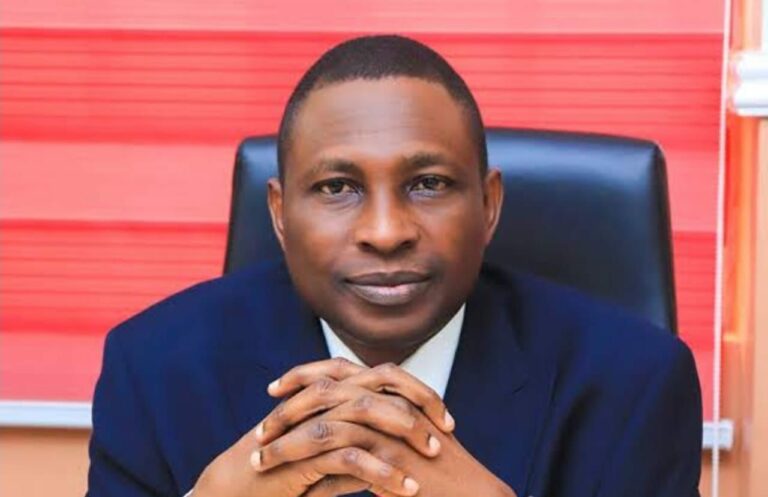
The Chairman of the Economic and Financial Crimes Commission, Ola Olukoyede, has alerted the public that some corrupt Nigerian politicians are now concealing their illegal wealth in cryptocurrencies to avoid detection by anti-graft agencies.
Olukoyede explained that the EFCC had identified a rising pattern in which dishonest public officials were using cryptocurrency wallets to hide embezzled funds and carry out illicit financial transactions.
He disclosed this on Thursday during an event marking Africa Anti-Corruption Day.
The event, monitored by The PUNCH, was held concurrently in Abuja, Lagos, and Ibadan, Oyo State.
Other speakers at the gathering expressed concern that Nigerians frequently fall victim to crypto-related scams, including the CBEX fraud, which saw citizens lose more than N1.3tn.
Olukoyede stated, “Virtual asset fraud is on the rise. Our findings show that fraudulent politicians are already perfecting schemes and hiding their loot in cryptocurrencies to beat the investigative blackness of anti-corruption agencies. Stolen funds and unexplained wealth are being warehoused in wallets and payment for services are being done through this window.”
He cautioned that although virtual assets have revolutionised global financial transactions, they have also opened new channels for money laundering and economic crimes.
He said, “Technology is moving at a supersonic speed around the world. The advent of virtual assets is a response to one of the qualities of money as a store of value like it is known in our elementary economies. However, as with every progressive innovation, fraud starts to usually evolve, evolve ways of perverting their genuine purposes.”
Olukoyede noted that the EFCC was not overwhelmed by these new methods, as ongoing training and intelligence collaboration had empowered the commission to detect and pursue such activities.
“But for us in the EFCC, virtual asset fraud and investment scams are not hard nuts to crack. Proactive and broad-based training and intelligence are bringing fraudulent schemes to the fore,” he said.
At the Lagos event, Olukoyede, represented by Chief of Staff/Lagos Zonal Director, Lagos Zonal Directorate 1, C. E. Michael Nzekwe, noted that virtual assets had become powerful tools for fraudsters and corrupt officials.
He observed that crypto fraud was growing both in Nigeria and across Africa, with criminals taking advantage of the anonymity and borderless features of blockchain platforms.
He pointed out that although virtual assets were created for convenience and as a value store, some individuals had repurposed them for illegal use.
Speaking in Ibadan, where the event was held at the Jagz Hotel conference hall, Olukoyede, represented by Acting Zonal Director of the Ibadan Zonal Directorate, Hauwa Ringin, said virtual asset fraud was spreading rapidly across Africa, much like investment fraud.
In Abuja, Muhammad Abdullahi, Deputy Governor of Economic Policy, representing Central Bank of Nigeria Governor Yemi Cardoso, revealed that Nigeria had witnessed a surge in crypto transactions, raising systemic financial risks.
He said over $56bn worth of crypto transactions were recorded in Nigeria between July 2022 and June 2023.
He said, “In Nigeria, over $56bn in crypto-related transactions were recorded between July 2022 and June 2023, making the country Africa’s digital transaction leader.”
However, he warned that this expansion had negative consequences.
He cited the CBN’s 2024 Financial Stability Report, which showed a 45% increase in financial fraud, with 70% of recorded losses linked to digital platforms and unregulated virtual asset services.
“Furthermore, over 30 Ponzi-style investment schemes exploiting digital currency narratives have been flagged by the SEC and other agencies,” he said.
He warned that these trends could tarnish Nigeria’s image on the international financial scene.
“These developments pose major risks, including loss of consumer confidence, weakening of financial integrity, and reputational challenges for Nigeria in the global financial system,” he said.
Cardoso noted that the CBN and the Securities and Exchange Commission had established a joint task force to oversee the virtual asset space, with backing from the EFCC and the Nigerian Financial Intelligence Unit.
He said, “We have intensified our regulatory and supervisory responses in several critical areas. Namely, on virtual accounts, following an extensive review of the operations of virtual accounts by deposit money banks and their fintech partners, we uncovered systemic weaknesses. These include poor KYC, knowing of customer practices, and insufficient transaction monitoring. We have acted to ensure that all firms strengthen KYC processes, improve oversight of fintech partnerships, and adhere to AML-CFT obligations.”
Cardoso also said the CBN was collaborating with the EFCC to develop a National Virtual Asset Wallet to store confiscated digital assets.
He emphasised the need for public education, particularly targeting youths who are often misled by fraudulent investment platforms.
“Technology-driven financial crimes are borderless, faceless, and fast-moving. Combating them requires strong institutions and coordinated action,” he said.
In Lagos, anti-fraud expert Kaina Garba explained key concepts surrounding virtual assets.
He described cryptocurrencies and tokens as digital forms of value that could be transferred online but are different from traditional money or securities like stocks.
Garba cautioned that the growth of digital finance had led to new crimes, including Ponzi schemes disguised as crypto projects, fake coin launches, phishing of crypto wallets, and laundering funds via crypto mixers.
“Criminals now exploit virtual assets to defraud unsuspecting investors. Many disappear with people’s hard-earned money after marketing fictitious tokens or projects,” he said.
He noted that while crypto had been unregulated in Nigeria in the past, the new Investment and Securities Act 2025 had created a legal framework for oversight.
He said the EFCC had responded by enhancing cybercrime units, investing in digital forensics, and increasing local and global collaboration.
Speaking for the SEC, Divisional Head of Legal and Enforcement, John Achile, reaffirmed the agency’s responsibility under the 2025 Investment and Securities Act.
“The SEC has a dual responsibility: investor protection and market development. With digital assets now legally recognised, we are regulating this space through structured incubation programmes and licensing procedures,” Achile stated.
He said the SEC had formed a Digital Asset Division and designed two streams—accelerated and managed—for evaluating applicants’ business models before granting licences.
“We do not just issue licences. We engage prospective exchanges or service providers to understand their operations and determine compliance before approval,” he explained.
In Ibadan, during a lecture themed “Understanding Virtual Asset and Investment Fraud,” criminology professor Oludayo Tade said, “People fall victim to fraud. What can we do? We need to ensure that anything too good to be true is a red flag. It’s a red flag because you know that we are in Nigeria and you know the condition of things. You know that even if you invest in a bank, the returns cannot be 50 per cent and somebody is offering you that to happen within a week. Another thing that they do is also to use the image, the reputation of individuals and organisations to launder their fraudulent tactics. But to prevent virtual fraud, virtual assets, you need to increase and improve on awareness level. How many Nigerians are aware of it? I’m very sure that those who fell victim to CBEX would find another scheme that is coming and will still join because people are looking for opportunities.”
In a goodwill message, Oyo State Sector Commander of the Federal Road Safety Corps, Rosemary Alo, represented by DCC OPS, Olugbesan, noted that joint efforts to monitor vehicle movement, especially against unregistered, fake, or cloned number plates, had helped disrupt illicit financial flows and aided the recovery of criminal proceeds.
Most Popular
-

 BIG STORY4 days ago
BIG STORY4 days agoJUST IN: ASUU Suspends Strike As Federal Government Pays June Salaries
-

 BIG STORY3 days ago
BIG STORY3 days ago“JAPA”: Canada Increases Minimum Proof Of Funds To N17m For Immigrants
-

 BIG STORY4 days ago
BIG STORY4 days ago“JAPA”: US Embassy Begins Screening Nigerian Students’ Social Media Accounts
-

 BIG STORY18 hours ago
BIG STORY18 hours agoJUST IN: US Clarifies New Visa Rule For Nigerians, Cites Global Security Standards
-

 BIG STORY1 day ago
BIG STORY1 day agoREVEALED: Trump’s Visa Clampdown Linked To Nigeria’s Refusal To House Asylum Seekers — TheCable Report
-

 BIG STORY3 days ago
BIG STORY3 days agoUK Introduces eVisas For Nigerian Study, Work Visa Applicants
-

 BIG STORY2 days ago
BIG STORY2 days agoTunji-Ojo Meets US Envoy Over New Visa Policy, Says FG Will Curb Overstay By Nigerians
-

 BIG STORY5 days ago
BIG STORY5 days agoJUST IN: Several Passengers Injured As Commercial Bus Somersaults On Lagos Third Mainland Bridge [PHOTOS]










Pingback: Lagos Policeman Caught Smoking Weed, IGP Orders Probe